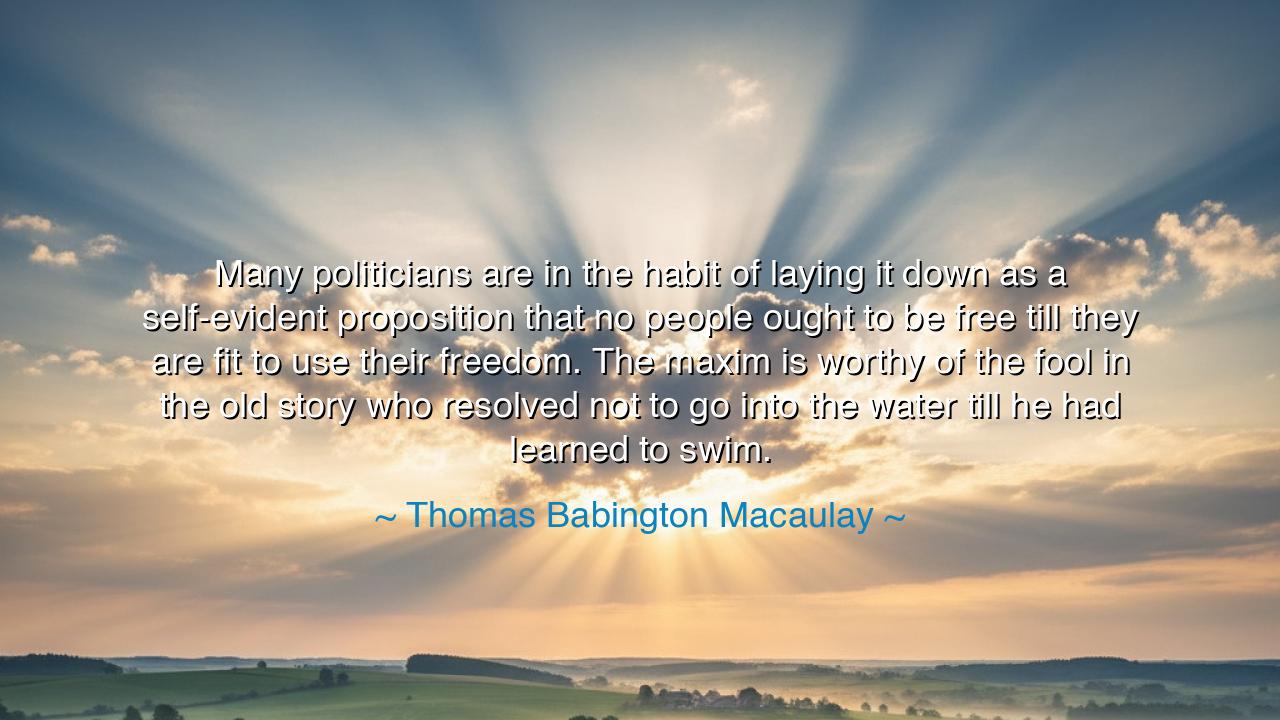
Many politicians are in the habit of laying it down as a
Many politicians are in the habit of laying it down as a self-evident proposition that no people ought to be free till they are fit to use their freedom. The maxim is worthy of the fool in the old story who resolved not to go into the water till he had learned to swim.






The words of Thomas Babington Macaulay thunder with reason and righteous scorn: “Many politicians are in the habit of laying it down as a self-evident proposition that no people ought to be free till they are fit to use their freedom. The maxim is worthy of the fool in the old story who resolved not to go into the water till he had learned to swim.” In this truth, Macaulay unmasks the false wisdom of those who withhold freedom, claiming that men and women must first prove themselves worthy of it. He answers that such thinking is folly, for no soul can learn to swim without first entering the waters. Liberty is not the reward for readiness—it is the teacher of it.
The ancients, too, wrestled with this paradox. The Greeks debated who was fit for citizenship, who deserved a voice in the polis. Yet the very act of participation forged character. To deny the people their liberty until they are “ready” is to deny them the very means by which they might become ready. Macaulay’s words echo as an eternal reminder: freedom is not bestowed as a prize for perfection, but as a birthright that, once exercised, strengthens the hands that hold it.
Consider the story of India’s independence. Many in the British Empire argued that Indians were unfit for self-rule, that they must first be “trained” in governance under colonial watch. But it was only after Gandhi’s movement, after the people seized the right to lead themselves, that they began the hard and noble work of shaping a democracy. Just as Macaulay’s fool could never learn to swim on dry land, no people can ever become free under the chains of another’s mastery. Only the plunge into freedom can teach the art of self-rule.
This teaching is also a rebuke to fear. Rulers, cloaked in paternal concern, often say: “The people are not ready.” Yet behind these words lies the shadow of control, for what ruler willingly yields power? Macaulay saw through this disguise, knowing that such arguments were not born of wisdom but of self-interest. By declaring a people “unfit,” oppressors justify their grip, while denying others the chance to grow into the dignity of liberty.
Let the generations remember: freedom is not learned in theory, but in practice. Just as the swimmer learns in the waters, so the people learn in the exercise of their rights. To wait until one is ready for freedom is to wait forever. Macaulay’s wisdom is clear—the way to liberty is not through cautious delay, but through the courage of granting it now, trusting that men and women, though they may falter, will rise stronger with each stroke.






MHTran Minh Hieu
Macaulay’s quote is a sharp critique of the tendency to delay freedoms based on arbitrary measures of 'fitness.' Freedom itself is the key to empowerment, not something that can be earned only after being deemed worthy. How much of history is shaped by this flawed logic, where those in power decide who is 'ready' for freedom? How often do we still see this idea applied today?
PTPhat Pham Truong
This quote by Macaulay resonates with the idea that politicians sometimes withhold freedom in the name of 'protection' or 'readiness.' The analogy to the fool who refuses to learn to swim seems to call out the absurdity of waiting for perfect conditions before granting basic rights. Could this concept still be relevant today, where political leaders use it as an excuse to suppress movements for greater liberty?
THThanh huyeenf
Macaulay's statement seems to challenge a long-standing argument about who decides when people are ready for freedom. By comparing this idea to the foolish notion of learning to swim only after entering the water, he suggests that freedom itself is an essential tool for growth. How often do we see this in modern politics, where the authorities claim that 'readiness' must come before rights? Isn’t this a way to delay progress?
LPLinh Pham
This quote strikes me as a condemnation of the paternalistic attitude often taken by governments or politicians who claim that citizens aren’t 'fit' for freedom. It’s ironic, because freedom itself is a learning process. How can one ever become fit to use their freedom if they are never allowed to experience it? Is there a risk in denying people freedom in the name of 'preparation'?
NNgoc
Macaulay’s quote critiques the idea that people must prove their readiness for freedom before they can have it. His comparison to the fool who waits to learn to swim before entering the water is a powerful metaphor. Is this philosophy an excuse used by those in power to withhold freedom from others? Shouldn’t freedom be the starting point, and should people not learn to navigate it as they go along?